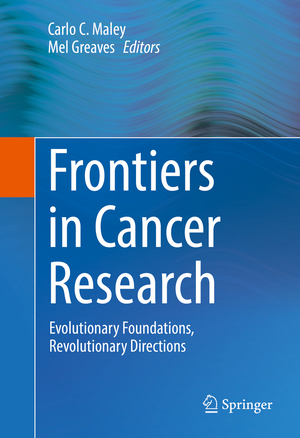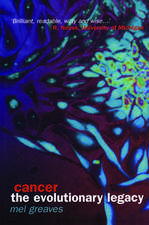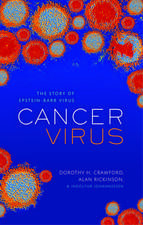Frontiers in Cancer Research: Evolutionary Foundations, Revolutionary Directions
Editat de Carlo C. Maley, Mel Greavesen Limba Engleză Hardback – 23 noi 2016
This book serves as a primer on the evolutionary and ecological theory of cancer- the framework upon which all the details of cancer may be hung. It is ideal for oncologists and cancer researchers interested in evolutionary theory, and evolutionary biologists and ecologists interested in gaining insights into cancer development and prevention.
| Toate formatele și edițiile | Preț | Express |
|---|---|---|
| Paperback (1) | 1092.99 lei 6-8 săpt. | |
| Springer – 19 iul 2018 | 1092.99 lei 6-8 săpt. | |
| Hardback (1) | 1099.94 lei 6-8 săpt. | |
| Springer – 23 noi 2016 | 1099.94 lei 6-8 săpt. |
Preț: 1099.94 lei
Preț vechi: 1157.82 lei
-5% Nou
Puncte Express: 1650
Preț estimativ în valută:
210.48€ • 225.07$ • 175.49£
210.48€ • 225.07$ • 175.49£
Carte tipărită la comandă
Livrare economică 18 aprilie-02 mai
Preluare comenzi: 021 569.72.76
Specificații
ISBN-13: 9781493964581
ISBN-10: 1493964585
Pagini: 381
Ilustrații: XIV, 258 p. 28 illus., 17 illus. in color.
Dimensiuni: 155 x 235 x 16 mm
Greutate: 0.56 kg
Ediția:1st ed. 2016
Editura: Springer
Colecția Springer
Locul publicării:New York, NY, United States
ISBN-10: 1493964585
Pagini: 381
Ilustrații: XIV, 258 p. 28 illus., 17 illus. in color.
Dimensiuni: 155 x 235 x 16 mm
Greutate: 0.56 kg
Ediția:1st ed. 2016
Editura: Springer
Colecția Springer
Locul publicării:New York, NY, United States
Cuprins
Introduction: Evolution in Cancer (Carlo Maley and Lauren Merlo)
Section I: Neoplastic Progression
Section I: Neoplastic Progression
- Epigenetics of clonal evolution in neoplastic progression (Brian Reid)
- The population genetics of neoplasms (Mary Kuhner, Simon Tavare or Josh Plotkin)
- Diversity in neoplasms (Lauren Merlo)
- How do clones expand? (Doug Brash)
- Evolution of cancer stem cells (Darryl Shibata & Simon Tavare)
- Competition and parasitism in and around neoplasms (TBD)
- Cooperation in and around neoplasms (Thea Tlsty or Charis Eng)
- Evolution of metastasis (James Talmadge, Rene Bernards or Bob Weinberg)
Section II: Interventions
- Clonal evolution in cancer prevention (Ernie Hawk or Scott Lippman)
- How to design multidrug therapy (TBD)
- Drug scheduling and selection for resistance (Natalia Komarova, Franziska Michor or E.A. Gaffney)
- Cechaxia and other causes of cancer mortality (John Pepper)
Notă biografică
Dr. Carlo C. Maley is an associate professor in the Biodesign Institute and the School of Life Sciences at Arizona State University. He is also the director of the Center of Evolution and Cancer at the University of California San Francisco, and the associate director of the Centre of Evolution and Cancer at the Institute of Cancer Research in London, UK. Dr. Maley earned a bachelor’s degree in computer science and psychology from Oberlin College. A Marshall Scholarship allowed him to obtain his master’s degree in zoology (evolutionary theory) from the University of Oxford, studying with W.D. Hamilton. He completed his education at Massachusetts Institute of Technology, with a doctorate in computer science (computational biology) working with Rodney Brooks and Michael Donohue. He did his postdoctoral training with Stephanie Forrest at the University of New Mexico and Brian J. Reid at the Fred Hutchinson Cancer Research Center. His research focuses on the application of evolutionary biology and ecology to cancer in order to address problems in the prevention, management and treatment of cancer.
Mel Greaves trained in Zoology and Immunology at University College in London and at the Karolinska Institute in Stockholm before focusing his research on cancer and leukaemia while at the Imperial Cancer Research Fund in London. Earlier in his career, he introduced novel, antibody/flow cytometry-based methods for biological classification of leukaemias that led to insights into the cellular origins of disease and more specific allocation of treatment. Greaves is responsible for establishing the first Leukaemia Research Fund Centre at The Institute of Cancer Research, London. His teams’ work on the molecular genetics of childhood leukaemia uncovered the pre-natal origin of this disease and shed light on its possible infectious causes. His current research is focussed on stem cells, genetic architecture and clonal evolution in leukaemia and on the evolutionary biology of cancer. This research has been recognised by many national and international awards including election to The Royal Society. Professor Greaves has eclectic interests in biology, cancer and medicine and is a strong supporter of the public understanding of science. He is the author of the popular science book – 'Cancer. The Evolutionary Legacy' (Oxford University Press). He’s also responsible for establishing the Centre for Evolution and Cancer at The Institute of Cancer Research, London.
Mel Greaves trained in Zoology and Immunology at University College in London and at the Karolinska Institute in Stockholm before focusing his research on cancer and leukaemia while at the Imperial Cancer Research Fund in London. Earlier in his career, he introduced novel, antibody/flow cytometry-based methods for biological classification of leukaemias that led to insights into the cellular origins of disease and more specific allocation of treatment. Greaves is responsible for establishing the first Leukaemia Research Fund Centre at The Institute of Cancer Research, London. His teams’ work on the molecular genetics of childhood leukaemia uncovered the pre-natal origin of this disease and shed light on its possible infectious causes. His current research is focussed on stem cells, genetic architecture and clonal evolution in leukaemia and on the evolutionary biology of cancer. This research has been recognised by many national and international awards including election to The Royal Society. Professor Greaves has eclectic interests in biology, cancer and medicine and is a strong supporter of the public understanding of science. He is the author of the popular science book – 'Cancer. The Evolutionary Legacy' (Oxford University Press). He’s also responsible for establishing the Centre for Evolution and Cancer at The Institute of Cancer Research, London.
Textul de pe ultima copertă
This is the ideal book for anyone contemplating starting a career in, or shifting their career to, studying the dynamics that drive cancer progression and its response to therapy. Topics include the theory and population genetics of cancers, genetic diversity within tumors (intra-tumor heterogeneity), understanding how mutant clones expand in tissues, the role of cancer stem cells in the dynamics of tumors, the evolution of metastasis, and how to improve cancer therapy by addressing the evolution of cancers in response to our interventions. There are also chapters on the patterns of cancer susceptibility in humans due to a mismatch between our modern environment and the environment in which our ancestors evolved, as well as a chapter on the evolution of cancer suppression mechanisms that have evolved in different species, particularly the large long-lived animals like elephants and whales that are better at suppressing cancers than humans.
This book serves as a primer on the evolutionary and ecological theory of cancer- the framework upon which all the details of cancer may be hung. It is ideal for oncologists and cancer researchers interested in evolutionary theory, and evolutionary biologists and ecologists interested in gaining insights into cancer development and prevention.
Caracteristici
The book will identify the most important, open questions in the evolutionary biology of cancer
The book will solicit reviews from experts in the field that answer 5 questions about each individual topic: 1) Why is the topic important? 2) What is currently known about the topic? 3) What are the short-term and long-term questions that must be answered? 4) What are the current obstacles to making progress? And 5) How can we overcome those obstacles (what are the experiments that should be done)?
Each chapter will be a seminal paper of a sub-field within the evolutionary biology of cancer that will facilitate progress in the field
The book will solicit reviews from experts in the field that answer 5 questions about each individual topic: 1) Why is the topic important? 2) What is currently known about the topic? 3) What are the short-term and long-term questions that must be answered? 4) What are the current obstacles to making progress? And 5) How can we overcome those obstacles (what are the experiments that should be done)?
Each chapter will be a seminal paper of a sub-field within the evolutionary biology of cancer that will facilitate progress in the field











